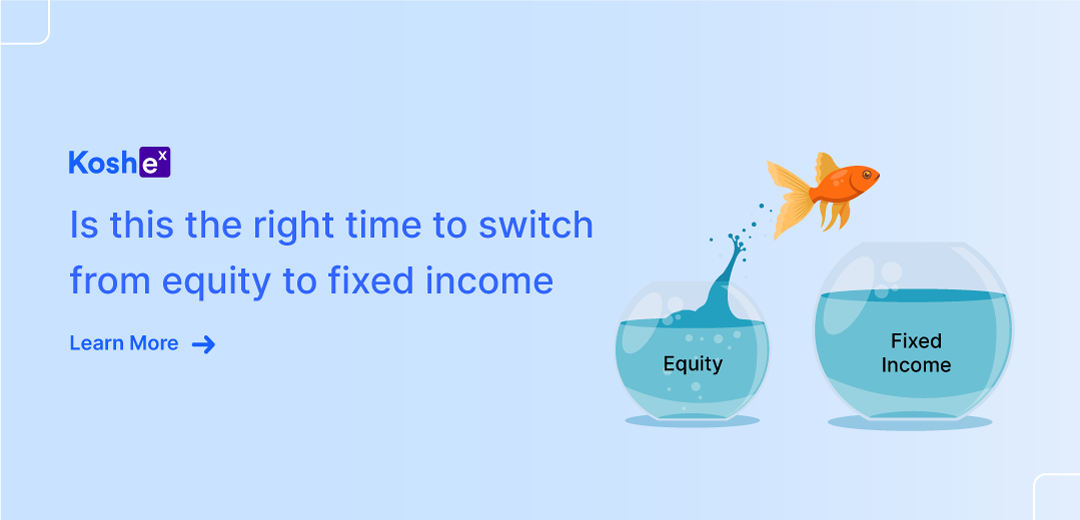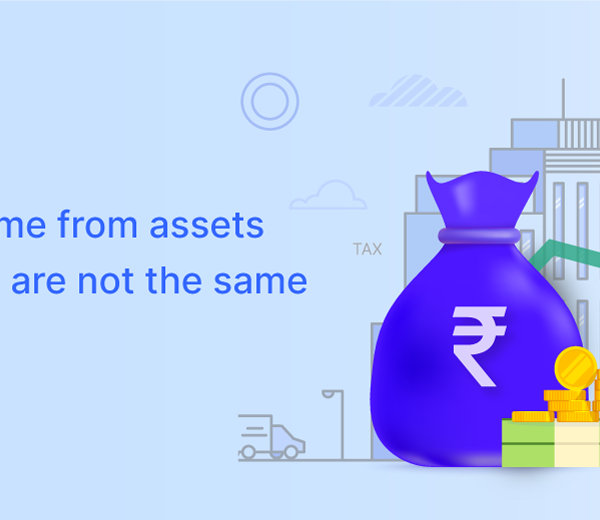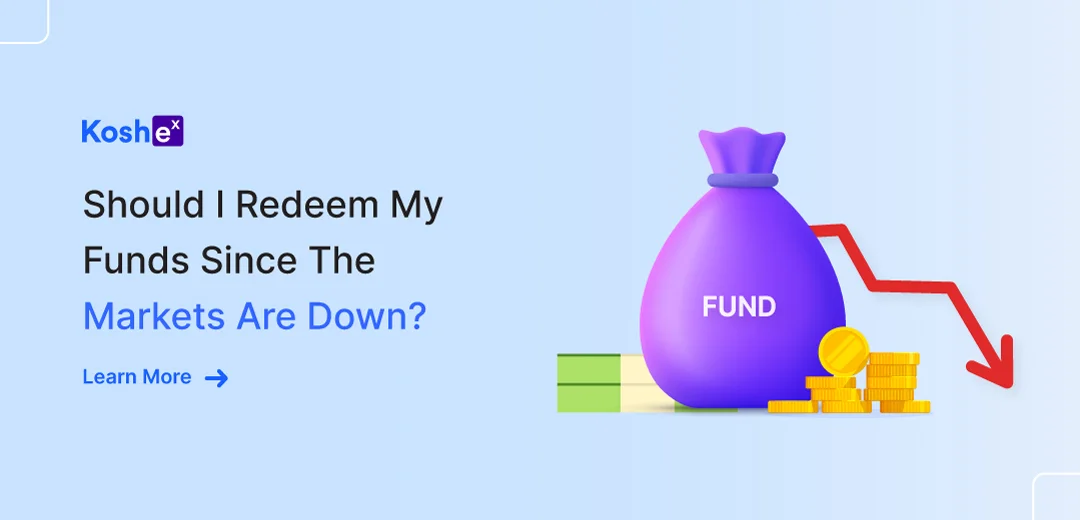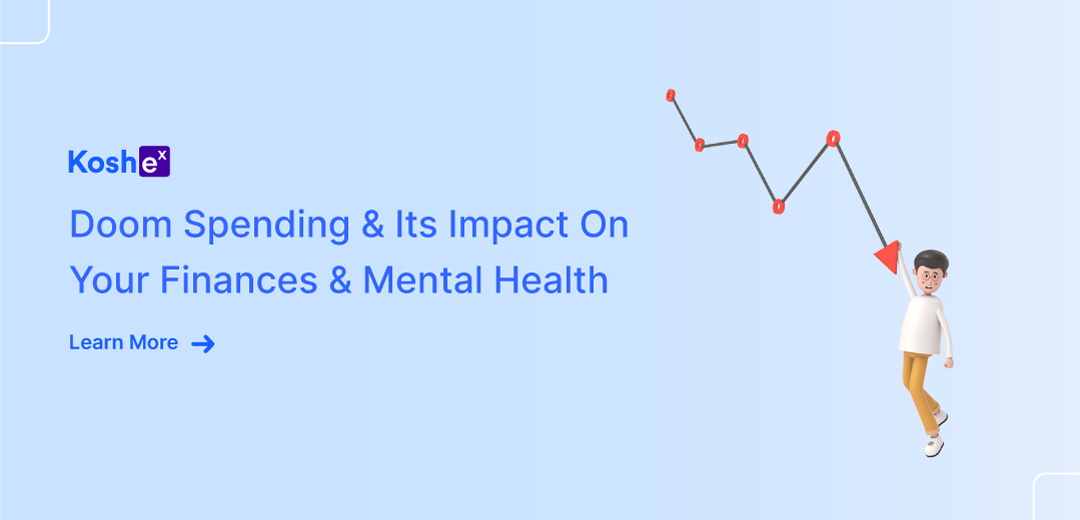In the ever-shifting landscape of financial markets, timing is often the keystone of successful investment decisions. Imagine this: you have been steering your investment through the unpredictable waters of the stock market, and now, on the horizon, you see an opportunity to navigate towards safer harbors. You have been waiting for this moment. The prospect of shifting from the high tides of equity to the steadier currents of fixed-income investments.
In this article, we will explore the pivotal transition from “Equity To Fixed Income.” We will dig into the various factors that influence the timing of such a switch, equipping you with the knowledge and insights required to make informed investment decisions.
The world of investments can be a maze, but with the right guidance from Koshex, you can navigate it confidently. Sign up with Koshex now to access hyper-personalized recommendations and make informed decisions in financial planning.
Understanding Equity and Fixed-Income Investments
Equity, often known as stocks or shares, represents a slice of ownership in a company. When you invest in equity, you become a shareholder, and your returns are linked to the company’s performance.
This connection comes with both exhilarating highs and nerve-wracking lows, as stock prices can be quite volatile. The potential for substantial gains exists, but so does the risk of significant losses.
On the other side, we have fixed-income investments. These are often considered the bedrock of financial stability. Fixed-income securities, like bonds or debentures, offer a set, predictable income stream over time. While the returns may not be as impressive as those from equities, the risks are significantly lower.
Balance is key in an ideal portfolio that combines both equities and fixed-income investments to harness the potential for growth while mitigating the impact of market fluctuations. However, maintaining a delicate balance is important to keep your financial planning afloat when the time to make the switch from equity to fixed income comes.
Assessing Your Investment Portfolio for Financial Planning
The key to maintaining a flourishing investment portfolio lies in understanding its ever-changing dynamics.
The following are the points to consider when thinking: Is this the right time to switch from equity to fixed income:
Financial Goals
Your financial objectives act as the compass guiding your investment decisions. Whether you are saving for a dream vacation, purchasing a new home, or planning for retirement, your goals define your investment strategy. Periodically revisiting these goals ensures that your portfolio aligns with your aspirations.
Risk Tolerance
Investors have varying levels of risk tolerance. Your willingness and capacity to endure market fluctuations should dictate the composition of your portfolio. If you find yourself losing sleep over market volatility, it may be a sign that your risk tolerance has changed.
Market Conditions
A bull market favors equities, while fixed income shines during bear markets. Regular portfolio assessments allow you to adapt to changing market conditions, ensuring your investments remain resilient.
The key to balancing your investment portfolio is to strike the right balance between growth and stability, aligning your portfolio with your current financial situation and goals.
Market Time Vs. Time in the Market
Many investors try to time the market, which means buying and selling stocks based on the expected movements of the market. They hope to buy low and sell high and make a profit from the price fluctuations.
However, timing the market is very difficult, if not impossible, to do consistently. It requires a lot of research, analysis, and luck to predict the future trends of the market. It also involves a lot of emotions, such as fear and greed, that may cloud your judgment and lead to irrational decisions.
Once you identify your investment goals and objectives, you can plan a better strategy to make a decision on whether you have to switch from Equity to Fixed income or not. If you want to invest for the long term and ignore the short-term noise, then you have to focus your time on the market. By doing so, you can benefit from the historical growth of the market over time.
Tax Implications
The following are some points about how income tax influences your investment strategy:
Switching Investments and Capital Gains
When you transition from equity to fixed income, you might have to pay capital gains tax. This tax is levied on the profit you make from selling your equity investments. It is important to understand how this tax works and how it impacts your returns.
Also Read: What Is ELSS And How Does It Work?
Timing Matters
The timing of your investment switch can also influence your tax liability. Depending on how long you have held your equity investments, you are eligible for different tax rates. For instance, long-term capital gains often receive preferential tax treatment compared to short-term gains.
Offsetting Gains with Losses
It is not just about the gains, losses can play a role too. In some cases, you can offset capital gains with capital losses, reducing your overall tax burden. Understanding this strategy and its implications can be a valuable tool in your tax planning.
Seeking Tax-Efficient Strategies
Certain types of fixed-income investments may offer tax advantages. By strategically selecting these options, you can potentially reduce your tax liability.
Final Takeaways
The decision to transition from equity to fixed income is a pivotal one in investments. Timing this shift requires a deep understanding of your financial goals, risk tolerance, and the ever-changing market conditions.
Understanding the tax implications is equally essential, as they can significantly impact your returns. While the temptation to time the market perfectly is ever-present, the truth is that staying invested over the long term tends to yield more reliable results.
Koshex offers hyper-personalized insights, helping you make informed decisions that align with your financial goals and tax-efficiency strategies. With its financial insights and personalized guidance, it can be your trusted navigator in financial planning. Sign up today with Koshex!
Frequently Asked Questions (FAQs)
Q1. Can I switch from equity to fixed income in phases?
Ans. Yes, transitioning gradually can help mitigate the impact of market volatility. It allows you to maintain a balanced portfolio while gradually reducing your exposure to equities.
Q2. Are there tax-efficient fixed-income investments?
Ans. Yes, certain fixed-income investments, such as Public Provident Funds (PPF), municipal bonds, and many more, offer tax advantages. These can be a tax-efficient option when transitioning from equity.
Q3. What are the benefits of long-term investing?
Ans. Long-term investing allows you to harness the power of compounding, potentially leading to significant portfolio growth over time. Additionally, It reduces the impact of short-term market fluctuations.
4. How often should I assess my investment portfolio?
Ans. Regular portfolio assessments, at least annually, are advisable. However, major life events or significant market shifts may warrant more frequent reviews to ensure your investments align with your goals.









Leave a Comment